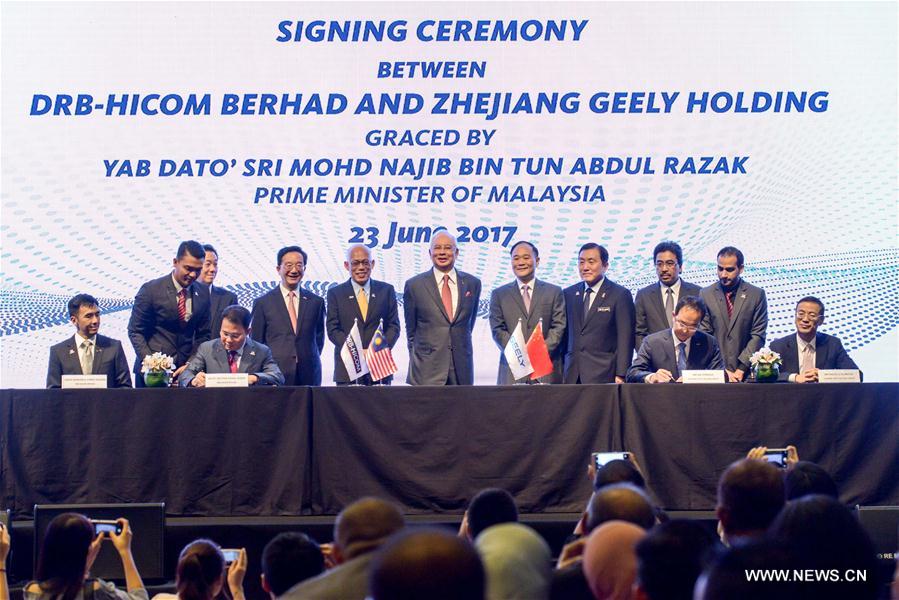


Malaysian Prime Minister Najib Razak (C) applauds during the signing ceremony in Kuala Lumpur, Malaysia, on June 23, 2017. China's Zhejiang Geely Holding Group on Friday signed an agreement to acquire a 49.9-percent stake in Malaysia's carmaker Proton, 30 days after an initial deal was reached between Geely and DRB-Hicom, the Malaysian conglomerate that owns 100 percent of Proton. (Xinhua/Chong Voon Chung)
KUALA LUMPUR, June 23 (Xinhua) -- China's Zhejiang Geely Holding Group on Friday signed an agreement to acquire a 49.9-percent stake in Malaysia's carmaker Proton, 30 days after an initial deal was reached between Geely and DRB-Hicom, the Malaysian conglomerate that owns 100 percent of Proton.
The deal was valued at 460.3 million ringgit (108 million U.S. dollars), including a cash injection of 170.3 million ringgit into Proton by Geely, and a sports utility vehicle platform that is worth 290 million ringgit, DRB-Hicom Managing Director Syed Faisal Albar told a press conference following the signing ceremony.
Syed Faisal said their immediate focus is to re-claim their position as Malaysia's best-selling car.
"Proton will now focus their efforts with Geely to gain market share domestically. With the joint capabilities of both companies, I am positive that we will be able to impact the market positively, by coming out with products that meet market preferences in terms of design and quality," he added.
Under the agreement, Geely will also buy a 51-percent stake in Proton's British carmaker Lotus.
Geely's Chairman Li Shufu also highlighted that his priority is to turn Proton and Lotus into a profitable entities.
He also said Proton and Lotus will create synergies for Geely to position themselves as a major player in the Southeast Asian market, which in turn will enhance the group's global position and help them to achieve sales target of 3 million units by 2020.
"We have solid plans, which will be put in place soon. We believe it will not be a long time (to turn around Proton) as we have confidence on Malaysian automotive market," he added.
When asked about the branding coordination between Geely and Proton, Li said Proton will be targeting the Southeast Asian market.
But he did not rule out the possibility that the production of Lotus will be brought to China, now the world's largest auto market.
Yet Geely still has a long way to go on Proton, even if it has successfully managed to revive Volvo, the Swedish car brand it acquired in 2010.
When attending the signing ceremony, Malaysian Prime Minister Najib Razk said Proton only sold 72,000 units in 2016, giving it barely 12 percent of the Malaysian market.
Underlining the need to find a foreign partner for Proton, Najib said Proton today competes in a totally new marketplace -- one in which there is much less protection to give its models the price advantage they enjoyed in its heyday.
A binding condition for the Malaysian government to grant credit to Proton is to seek a foreign strategic partner (FSP). DRB-Hicom said in a statement in February that it hopes an FSP can immediately increase the production capacity of Proton's manufacturing plant in Tanjung Malim, which now has a low utilization rate.
"The Malaysian automotive market is not big enough, and with a small market, it becomes more challenging to put in a lot of money to fund R&D without proper volume in return," said Johari Abdul Ghani, Malaysia's second finance minister.
Mohd Shanaz Noor Azam, an analyst with Malaysia's CIMB Bank, estimated that Proton may need an annual production of between 150,000 to 200,000 units to break even.

 Award-winning photos show poverty reduction achievements in NE China's Jilin province
Award-winning photos show poverty reduction achievements in NE China's Jilin province People dance to greet advent of New Year in Ameiqituo Town, Guizhou
People dance to greet advent of New Year in Ameiqituo Town, Guizhou Fire brigade in Shanghai holds group wedding
Fire brigade in Shanghai holds group wedding Tourists enjoy ice sculptures in Datan Town, north China
Tourists enjoy ice sculptures in Datan Town, north China Sunset scenery of Dayan Pagoda in Xi'an
Sunset scenery of Dayan Pagoda in Xi'an Tourists have fun at scenic spot in Nanlong Town, NW China
Tourists have fun at scenic spot in Nanlong Town, NW China Harbin attracts tourists by making best use of ice in winter
Harbin attracts tourists by making best use of ice in winter In pics: FIS Alpine Ski Women's World Cup Slalom
In pics: FIS Alpine Ski Women's World Cup Slalom Black-necked cranes rest at reservoir in Lhunzhub County, Lhasa
Black-necked cranes rest at reservoir in Lhunzhub County, Lhasa China's FAST telescope will be available to foreign scientists in April
China's FAST telescope will be available to foreign scientists in April